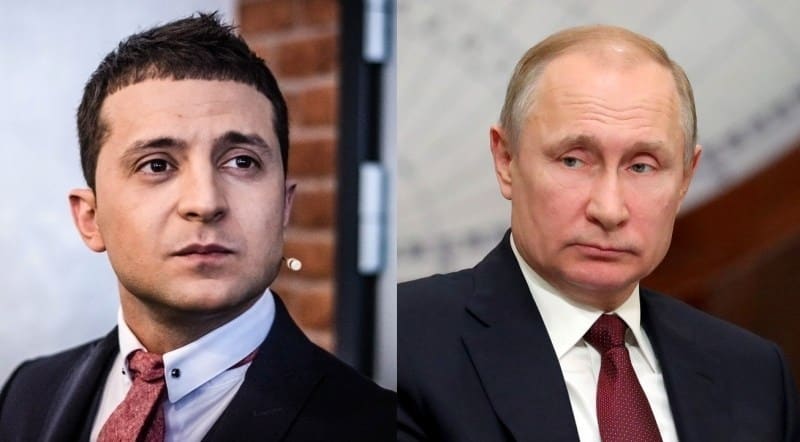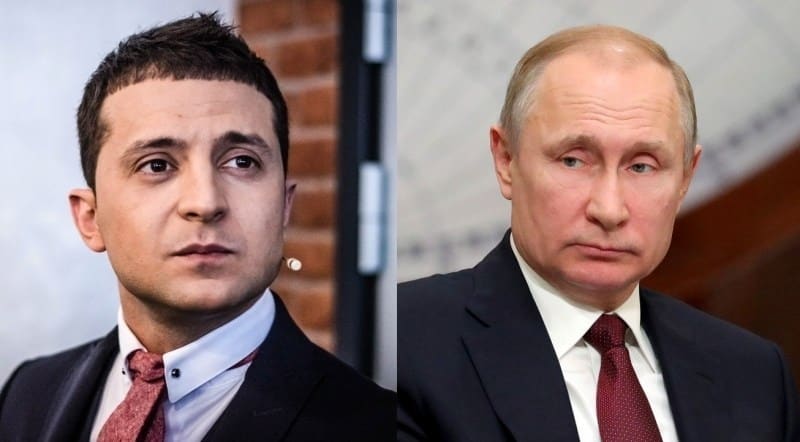The ice in the frozen lake shifting is one of the coolest sounds you can hear. The air is cold but not freezing, and the woods are silent. The frozen lake looks like it’s been stopped in time, but beneath the placid surface it keeps shifting and moaning. The phenomenon produces amazing sci-fi sound — like a cracking whip.
The phone conversation between the presidents of Ukraine and Russia — Volodymyr Zelensky and Vladimir Putin — last Friday brings to mind the frozen lake acoustics. It lasted for 20 minutes, long enough for two Russian-speaking statesmen to exchange opinions. Zelensky took the initiative, but most certainly, there was some advance planning.
The Kremlin readout was taciturn but acknowledged that the two leaders discussed “issues of a settlement in the southeast of Ukraine” and “opportunities to continue contacts in the Normandy format.” The Kremlin took care to play down the phone call.
Earlier last week, Zelensky had publicly suggested that he and Putin meet in Minsk, Belarus, to discuss the conflict in Ukraine’s east and Russia’s 2014 annexation of Crimea. He added that he would like the leaders of the United States, Britain, France, and Germany to join the talks. Putin reacted to the idea saying he’s open for talks with Zelensky, but negotiations would be unlikely before Ukraine’s parliamentary elections due on July 21 and after a new Ukrainian Cabinet is formed. Evidently, back channels have been working.
There is a substantial section of opinion within Ukraine that favours restoration of friendly ties with Russia despite all that has happened — Crimea, et al. Arguably, it was this groundswell of opinion that coasted Zelensky to such a massive victory in the presidential election in April.
Moscow pinned hope on Zelensky’s victory. Since April, that hope has somewhat faded, as Moscow wonders how far Zelensky would capitalise on the popular opinion within Ukraine to move forward with Russia. Evidently, Moscow is encouraging a process in that direction and the back channel contacts serve that purpose.
However, the powerful constituency of Ukrainian nationalists who were the street fighters spearheading the ‘regime change’ in 2014 remain the great spoiler. They enjoy tacit western backing, too. The nationalists, who include neo-Nazi elements, are a violent lot and have a record of coercive methods to force their will on the authorities. And they are well organised in an otherwise highly fragmented political landscape.
The nationalists have challenged Zelensky. Then, there is the parliament, which Zelensky did not control. The Ukrainian constitution vests with the parliament enormous powers regarding policies and cabinet appointments. Zelensky did the expected thing — he disbanded the parliament and called for fresh election under revised electoral laws that give weightage to proportional representation for political parties. He hopes that his newly formed party would muster a majority — or at the very least, it will be able to form the government with support from pro-Russia parties. It is not a misplaced hope, since his party is hugely popular.
Zelensky is walking a fine line. Certainly, the western powers, which backed the regime change in Ukraine in 2014, will not allow Zelensky a free hand to open a direct line to Moscow without their knowledge or consent. Last week, the G7 ambassadors questioned Zelensky’s prerogative to lustrate Ukrainian officials who held office after the regime change in 2014 (who are almost all western surrogates in key positions in the Ukrainian state apparatus.)
Under these circumstances, Moscow has no option but to mark time and wait for Zelensky to consolidate his grip on the power calculus in Kiev. Even then, he is dependent on western support and cannot make overtures to Moscow without the consent of the US and its EU allies. Clearly, the West will not let go its hard-fought control over Ukraine, whose geographical location is highly strategic — although Ukraine’s membership of NATO or the EU will be a long haul.
From the Russian perspective, the key would lie in breaking the stalemate in the separatist region of Donbas. The working group meeting on Donbas due on Wednesday in Minsk will be keenly watched for signs if Zelensky will discard his predecessor Petro Poroshenko’s anti-Russian line and instead adopt a constructive approach on Donbas. The return of Donbas to Ukraine is an electoral pledge Zelensky had made. Russia too favours such a denouement as the equilibrium of public opinion within Ukraine will decisively shift in favour of friendly relations with Russia if Donbas rejoins Ukraine.
Depending on the outcome of the expert-level meetings currently under way, a summit meeting of the Normandy Quartet (France, Germany, Russia and Ukraine) cannot be ruled out. However, the key question is how far the West is interested in resolving the Ukraine crisis?
To be sure, the West is apprehensive that Russia has ‘hidden resources’ within Ukraine to leverage Zelensky’s policies. Therefore, any proximity developing between Moscow and Kiev — or between Putin and Zelensky — will trigger disquiet in the western mind. Broadly, Zelensky is a good thing to have happened from the Russian viewpoint, but Moscow has to pretend otherwise lest he became a ‘burnt out’ case. The G7 ambassador’s demarche to block Zelensky’s attempt to revamp the administration and wean it away from the legacy of the ‘Euromaidan’ only goes to show that there is a keen tussle going on to ensure that Moscow’s capacity to influence Kiev remains under severe scrutiny.
What happens in Ukraine in the coming months provides a signpost of the trajectory of Russia’s relations with the West. There are good and bad signs. The US’ transatlantic leadership has come under cloud due to Trump’s controversial policies (and abrasive behaviour), but in the final analysis, the US still wields enough influence to make sure that a common position with regard to Ukraine remains in place, especially in respect of the EU sanctions against Russia.
On the other hand, there is growing exasperation in Europe about Ukraine’s future. France and Germany also recognise that Russia’s cooperation is needed for addressing other regional and international issues of concern to Europe. China’s rise worries Europe and Russia has the potential to be a balancer, too.
The bottom line is that the present stalemate over Ukraine is actually a legacy of the Barack Obama presidency. How far Trump attaches centrality to Ukraine — as Obama did — is unclear. However, within the US establishment, there is adherence to the compass set by Obama, which aimed to create discord between Russia and Europe, which strengthened the US’ transatlantic leadership and gave ballast to the North Atlantic Treaty Organisation (NATO).
Obama met with remarkable success in putting a spoke in the wheel of the Russo-German axis in the heart of Europe. Again, thanks to Obama, NATO is thriving today, with Russia providing it the much-needed ‘enemy’ image. The NATO has advanced to Russia’s borders and is lurching toward the Black Sea, which used to be a ‘Russian lake’ historically.
Reprinted with permission from IndianPunchline.com.


